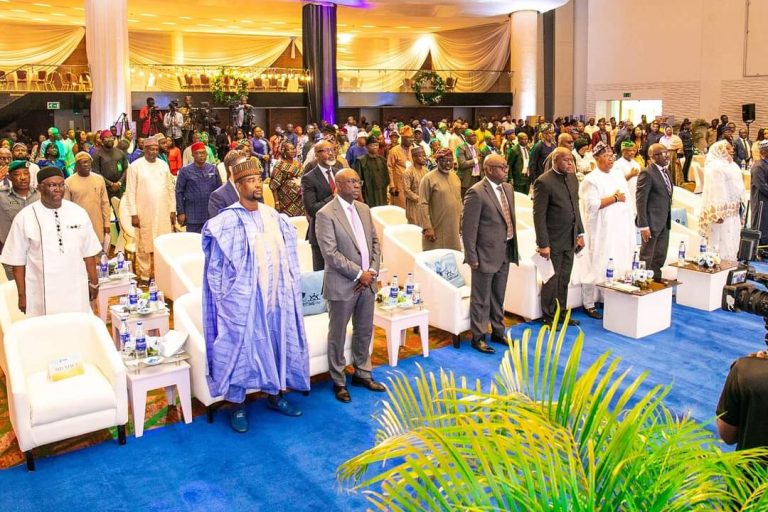
By Oluyinka Onigbinde
The Minister of Marine and Blue Economy, Mr. Adegboyega Oyetola has reinstated the need for the country to prioritize investments in upgrading port facilities to ensure safe shipping and enhance operational efficiency in the maritime sector.
Speaking in Lagos on Thursday at this year’s World Maritime Day, themed “Navigating the Future: Safety First,” Oyetola highlighted the critical role of increased investments in helping Nigeria build capacity and remain competitive in global seaborne trade.
Represented by Mr Michael Oloruntola, the Permanent Secretary of the ministry, Oyetola urged stakeholders to re-assess the safety and security challenges facing the maritime sector, particularly in light of emerging technologies and alternative fuels designed to reduce greenhouse gas (GHG) emissions from ships.
The minister emphasized that the Federal Ministry of Marine and Blue Economy is taking proactive steps to improve the maritime sector by embracing new technologies and fostering innovation to stimulate growth.
“Among the ministry’s key initiatives are the digitalization and automation of port operations to boost safety, security, and efficiency, as well as performance optimization aimed at reducing costs and improving reliability. We are also adopting innovative practices to steer the industry toward sustainable development,” Oyetola explained.
He added that President Bola Tinubu’s administration is heavily investing in port modernization to cut inefficiencies, reduce operational costs, and improve safety. These initiatives are being financed through Public-Private Partnerships (PPP) arrangements.
Oyetola noted that the government has made substantial progress in creating a conducive environment for port operations by aligning its policies with global best practices. This has resulted in notable improvements in safety, security, and efficiency, leading to reduced delays in processing exports and imports.
However, the minister stressed that continued support from the private sector is essential to provide the resources and state-of-the-art facilities needed to elevate Nigeria’s maritime industry to a new level.
He also reaffirmed Nigeria’s commitment to aligning its regulatory framework with International Maritime Organisation (IMO) standards and other international maritime regulations, underscoring the country’s dedication to upholding the highest standards of maritime safety.
Earlier, Dr. Abubakar Dantsoho, Managing Director of the Nigerian Ports Authority (NPA), had revealed that the authority is nearing the final stages of deploying the Port Community System (PCS). He explained that the PCS would lay the foundation for the operationalization of the Federal Government’s National Single Window Project.
Represented by the Executive Director, Engineering & Technical Services, Engr. Ibrahim Umar, Dantsoho highlighted the pivotal role of the maritime sector in both national economic prosperity and global economic sustainability.
“Automation is the linchpin of port efficiency, and the Nigerian Ports Authority is in the final stages of implementing the PCS, which will pave the way for the National Single Window Project,” Dantsoho said. “This is complemented by the comprehensive modernization of port infrastructure and equipment to enhance competitiveness.”
He emphasized that achieving the objectives of the World Ports Sustainability Program, which aims to make global port operations safer, healthier, and more secure, relies heavily on the involvement of policymakers, investors, and stakeholders.
Dantsoho concluded by reiterating the NPA’s unwavering commitment, under the leadership of Minister Oyetola, to maximizing the opportunities available in Nigeria’s maritime sector for the benefit of the nation and the world at large.
Aslo speaking at the event, Dr. Dayo Mobereola, Director General of the Nigerian Maritime Administration and Safety Agency (NIMASA), called on stakeholders to renew their commitment to safety, innovation, and responsible stewardship of the marine environment.
“While the maritime industry faces numerous challenges, including rapid technological advancements, environmental concerns, and evolving global trade patterns, these challenges also present opportunities for tremendous success,” Mobereola noted.
He stressed the importance of prioritizing safety by investing in cutting-edge safety technologies, enhancing workforce training, strengthening regulatory frameworks to meet international standards, and fostering public-private collaboration.
“NIMASA is at the forefront of creating a safer, more efficient, and sustainable maritime future for Nigeria and beyond,” he stated, urging stakeholders to collaborate in addressing the complexities arising from emerging technologies.















